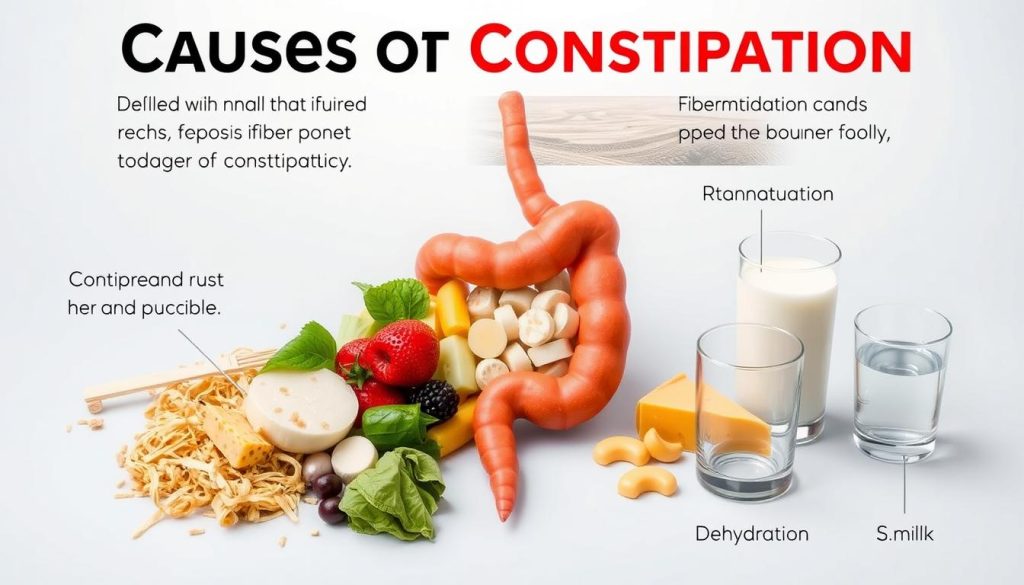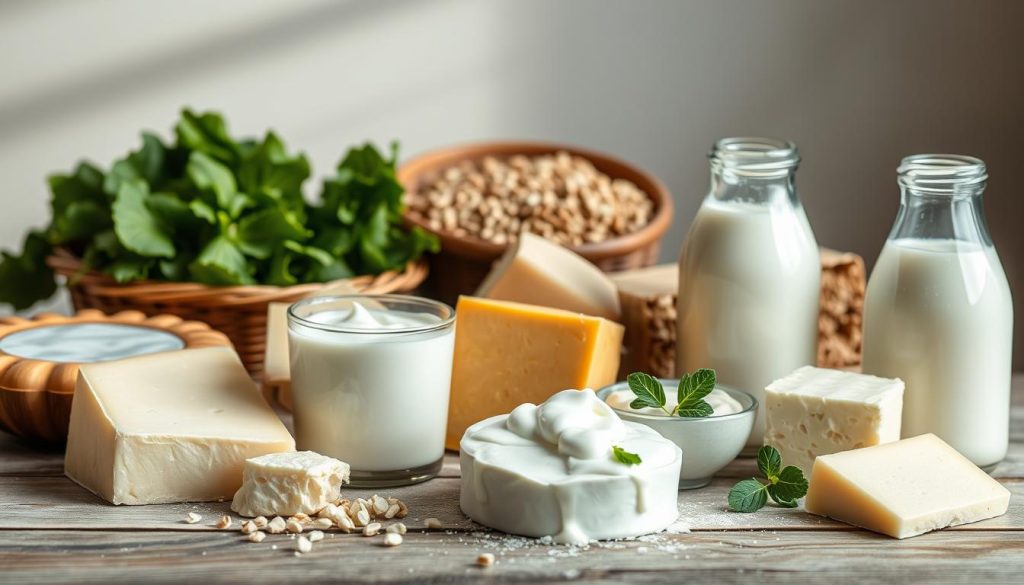It’s a question often asked in grocery aisles and over morning cereal: do milk products cause constipation? Some people love dairy, but others feel bad after eating it. The link between dairy and digestive health is unclear. Is milk the enemy of good digestion, or is it harmless?
We will look at the facts and research together. We aim to understand how dairy affects our digestion. Let’s dive into the details and find out the truth.
Understanding Constipation and Its Causes
Constipation is a common issue that affects many people. It can really hurt digestive health. By defining constipation and looking at its causes, we can better understand and manage it.
Defining Constipation and Its Symptoms
Constipation means having bowel movements that are too infrequent or hard to pass. The symptoms of constipation include having less than three bowel movements a week. Other signs are straining, having lumpy or hard stool, and feeling like you didn’t fully empty your bowels.
Overview of Typical Causes of Constipation
The causes of constipation are varied. They can be due to what you eat and drink, how active you are, or even certain medications. Here are some common reasons:
- Inadequate fiber intake in the diet
- Low fluid consumption
- Limited physical activity
- Medications that reduce bowel motility
- Medical conditions that affect the digestive system
To improve digestive health, you might need to change your diet and lifestyle.
| Cause | Effect on Bowel Movements | Proactive Measures |
|---|---|---|
| Inadequate Fiber | Harder, less frequent stools | Increase intake of fruits, vegetables, and whole grains |
| Low Fluid Intake | Stools that are dry and difficult to pass | Drink more water and non-caffeinated beverages |
| Reduced Physical Activity | Decreased bowel motility | Incorporate regular exercise into daily routine |
| Certain Medications | Slower digestive system | Discuss alternatives or adjustments with healthcare provider |

Do Milk Products Cause Constipation?
Looking into dairy products and bowel movements, we wonder if dairy might cause constipation. Dairy, like milk, cheese, and yogurt, has proteins and sugars like casein and lactose. These can be hard for some to digest. This part talks about the worries and how people react differently to these substances, showing how milk products and gut health are connected.
Lactose in dairy is often blamed for digestive problems. For those who can’t digest lactose, it can cause bloating, diarrhea, and constipation. But, how dairy affects bowel movements varies a lot. For some, it might make bowel movements slower, while others might not notice any issues.

The fat in dairy is also important. High-fat dairy might make digestion slower, causing constipation. But, fermented dairy like yogurt has probiotics. These can help with gut health and regular bowel movements.
To really understand how dairy affects digestion, we need to look at many things. This includes what someone eats, their health, and even their genes. Here’s a quick summary:
- Lactose Intolerance: Can lead to various digestive symptoms, including constipation.
- Fat Content: High-fat dairy might slow digestion, while low-fat options may have less impact.
- Fermented Dairy Products: Generally more gut-friendly, potentially helping to regulate bowel movements.
The impact of dairy on bowel health is different for everyone. Some might need to cut down on dairy or choose lactose-free options to avoid constipation. Others might not see any effect on their digestion. Finding out how dairy affects you personally can help guide your gut health.
The Link Between Dairy and Constipation
Dairy is often questioned for its possible role in constipation. This section looks into the dairy and constipation connection through research and observations. It aims to understand how dairy might affect bowel movements.
Case Studies and Research Findings
Many studies have found a link between milk and constipation, mainly in infants and the elderly. When people with digestive issues cut down on dairy, they often see better bowel regularity and less discomfort.
Dairy as a Possible Irritant to the Bowel
It’s important to consider lactose, the sugar in milk, when looking at dairy’s impact on the gut. For those without enough lactase, symptoms like bloating, gas, and constipation can occur. This shows the complex relationship between milk and digestive issues.
| Dairy Product | Symptom Triggered | Population Most Affected |
|---|---|---|
| Whole Milk | Bloating, Constipation | Infants, Elderly |
| Cheese | Constipation | Adults with Lactase Deficiency |
| Butter | Minor Constipation | People with IBS |
Exploring Lactose Intolerance and Constipation
Lactose intolerance is a common digestive problem. It makes it hard for people to digest lactose in dairy products. Symptoms include stomach pain, bloating, and constipation. Knowing how lactose intolerance and constipation are linked is key to managing diet and keeping the bowels healthy.
Lactose intolerance happens when the body lacks lactase, the enzyme to break down lactose. Without enough lactase, lactose moves through the body without being digested. This can cause constipation. Understanding the symptoms and causes of lactose intolerance helps in making dietary changes to avoid digestive problems.
- Symptoms of lactose intolerance often include gas, bloating, and abdominal cramps.
- Constipation associated with lactose intolerance is marked by infrequent or hard bowel movements.
- Dietary adjustments, such as reducing or eliminating dairy consumption, can help manage symptoms.
To further illuminate the relationship between lactose intolerance and constipation, here is a visual guide:
| Impact | Symptom | Dietary Adjustments |
|---|---|---|
| Lactose Intolerance | Constipation, Gas, Bloating | Reduce dairy, Consider lactose-free alternatives |
| Normal Digestion | Regular bowel movements | Maintain balanced diet |
Understanding lactose intolerance helps in making better dietary choices. This improves digestion and prevents constipation. If you’re experiencing constipation, check your lactose intake. Try lactose-free options or talk to a healthcare professional for better digestive health.
Milk and Digestive Issues in Detail
Understanding how dairy affects the digestive system is key for those with milk sensitivity and constipation. Dairy has different parts that can affect how our gut works. This is mainly due to milk proteins and lactose.
How Milk Can Affect Gastrointestinal Function
Milk can affect the digestive system in some people. Lactose, a sugar in milk, needs special enzymes to digest. Without these enzymes, lactose can cause bloating, gas, and pull water into the colon.
This can lead to constipation or diarrhea. It’s all about how our body handles lactose.
Milk Proteins and Their Impact on Digestion
Milk proteins like casein and whey are also important for digestion. They are good for us but can cause problems in some. These proteins can make the gut slow down, leading to constipation.
Knowing how milk affects our digestion helps manage symptoms of milk sensitivity and constipation. Let’s look at how different milk proteins affect our sensitive guts.
| Milk Protein | Potential Digestive Impact |
|---|---|
| Casein | Can cause inflammation in sensitive individuals, potentially leading to slower gastrointestinal transit times. |
| Whey | Could accelerate intestinal processes but might provoke lactose intolerance symptoms in some cases. |
How Dairy Products Affect Bowel Movements
Exploring the link between dairy products and bowel movements is key. It shows how these foods can affect our digestive health. They might even cause constipation. Dairy has lactose, fats, and proteins that affect digestion.
Dairy is common in many diets but affects people differently. For some, it helps with regular bowel movements. But for others, it can cause constipation. Let’s dive deeper:
- Lactose: This milk sugar is hard to digest for many. It can cause bloating and constipation if you don’t have enough lactase enzyme.
- Dairy fats: High-fat dairy can slow digestion. This might cause bowel movements to slow down in some people.
- Casein and whey: Some dairy proteins can be hard on the stomach. This can make constipation worse for some.
Different dairy products affect people in different ways. Knowing these effects can help manage digestive issues. It’s about finding the right balance and understanding how dairy impacts your body. Making smart choices about dairy can help keep your digestive system healthy and comfortable.
Lactose Tolerance vs. Milk Sensitivity
It’s important to know the difference between lactose intolerance and milk sensitivity. Both can cause bloating, gas, and discomfort. But they have different reasons for these symptoms in people with dairy issues.
Understanding Lactose Intolerance
Lactose intolerance happens when the body can’t break down lactose, a sugar in dairy. Without enough lactase enzyme, lactose stays undigested in the gut. This leads to discomfort. Symptoms usually show up a few hours after eating dairy.
Identifying Non-Lactose Milk Sensitivity
Milk sensitivity is different from lactose intolerance. It’s about immune reactions to proteins in milk, like casein or whey. Symptoms can range from digestive issues to skin rashes or breathing problems. They might start right away or take time to show up. Knowing the difference helps with diet choices and gut health.
Navigating Milk Sensitivity and Its Link to Constipation
For those dealing with milk sensitivity and constipation, knowing how to manage dairy sensitivity is key. This guide will show you ways to ease discomfort and lower constipation risk.
Dealing with milk sensitivity and constipation often means changing your diet. Cutting down or removing dairy is a good start. But, it’s also about choosing better foods overall. Here are some helpful tips:
- Experiment with Dairy Alternatives: Try non-dairy milks like almond, soy, or oat milk. They’re less likely to cause constipation and digestive problems.
- Increase Fiber Intake: Soluble and insoluble fibers help keep bowel movements regular. This reduces constipation risk.
- Stay Hydrated: Drinking enough water is key when cutting down on dairy. It helps your digestive system work well.
Changing your lifestyle is also important for managing dairy sensitivity. Regular exercise can boost digestive health and help with bowel movements. This can lower constipation chances.
Supplements like probiotics can also help. They balance gut flora, which is vital for those with milk sensitivity. Always talk to a healthcare professional before starting any supplements.
Everyone reacts differently to food and treatments. So, it’s wise to talk to a healthcare provider before making big diet or lifestyle changes. They can make sure these changes are safe and right for you.
The Role of Dairy Products in Gut Health
Dairy’s effect on digestion is complex. It depends on the presence of probiotics and the balance of gut bacteria. As people learn more about how food affects health, knowing about dairy’s role in gut health is key.
Probiotics in Dairy: Are They Always Beneficial?
Not all dairy is good for your gut. But yogurts and fermented milks with live cultures are beneficial. These products have Lactobacillus and Bifidobacterium, which help balance gut bacteria.
- Lactobacillus strains are beneficial for gut health, improving digestion and nutrient absorption.
- Bifidobacterium helps reduce inflammation and supports good bacteria.
But, not all probiotics are the same. Their effects can vary based on your health and gut bacteria. So, while dairy probiotics can help, their benefits depend on many factors.
Dairy and the Microbiome’s Balance
Dairy’s impact on gut health goes beyond probiotics. How well you digest dairy and your ability to break down lactose matter too.
For those who can’t digest lactose, dairy can upset the gut balance. They might find lactose-free options or plant-based alternatives helpful.
Also, dairy’s interaction with the gut is complex. Getting personalized dietary advice is important. Choosing dairy with probiotics and balancing it might keep your gut healthy.
Understanding the Nutritional Content of Milk Products
When we look at milk products, we need to focus on their nutritional content and how they affect our digestion.
The Importance of Dietary Fiber in Preventing Constipation
Milk products are known for their calcium and important nutrients. But, they don’t have much dietary fiber. This is important because fiber helps prevent constipation by making stool bulkier and easier to pass.
Calcium in Milk: Constipation Culprit or Not?
Some research says too much calcium in milk might cause constipation. This is because calcium can make stool harder. But, calcium is also good for our bones, so we need to get it right.
Knowing how your body reacts to milk’s nutrients can help you make better food choices. This can help avoid constipation problems.
| Component | Effect on Digestion | Recommended Intake |
|---|---|---|
| Calcium | Potentially hardens stool | 1000-1200 mg/day |
| Dietary Fiber | None in milk; necessary from other sources | 25-30 g/day |
Benefits and Risks of Dairy Products in Your Diet
Understanding the benefits of dairy products and the risks of dairy consumption is key. Dairy is a great source of calcium, vitamin D, and protein. But, knowing both sides is important for smart choices.
- Nutritional Benefits: Dairy is full of calcium, which is good for bones. It also has high-quality proteins for muscle repair and growth.
- Health Risks: Some people may face issues like lactose intolerance, allergic reactions, or inflammation from dairy.
Considering dairy’s role in a balanced diet is important. It depends on your digestion and nutritional needs. Here’s how dairy affects health:
| Aspect of Health | Benefits of Dairy Products | Risks of Dairy Consumption |
|---|---|---|
| Bone Health | Increases bone density with high calcium. | Minimal risks but can affect mineral balance. |
| Digestive Health | Some dairy has probiotics for digestion. | Lactose intolerance can cause discomfort and bloating. |
| Cardiovascular Health | Contains potassium for heart health. | Saturated fats in some dairy can increase cholesterol. |
The benefits of dairy products are clear for nutrition and health. But, knowing the risks of dairy consumption is just as important. This balance helps create a diet that’s healthy and comfortable, even for those sensitive to dairy.
Alternatives to Dairy Products for Those With Constipation
If dairy products cause constipation, trying dairy alternatives can help. These non-dairy options offer digestive advantages and constipation relief. They make digestion easier without losing out on taste or nutrition.
Dairy Substitutes and Their Digestive Advantages
Non-dairy alternatives are great for digestion. Almond milk, soy milk, and coconut milk are good choices. They have nutrients and no lactose, which can upset your stomach. These options help keep your digestive system balanced and may ease constipation symptoms.
Choosing the Right Non-Dairy Options for You
When picking non-dairy options, think about taste, nutrition, and how they affect your stomach. Knowing the digestive benefits of each can help you choose wisely. This way, you can find the best fit for your health.
| Non-Dairy Option | Key Nutrients | Digestive Benefits |
|---|---|---|
| Almond Milk | Vitamin E, Calcium | Low in irritants, easy on the stomach |
| Soy Milk | Protein, Potassium | May enhance intestinal movement |
| Coconut Milk | Magnesium, MCTs | Naturally hydrating, aids in smooth digestion |
Trying non-dairy options can help with constipation caused by dairy. These alternatives offer digestive advantages and constipation relief. They also make your diet more varied and fun.
How to Determine if Dairy Is Causing Your Constipation
To figure out if dairy is causing your constipation, you need to look closely at your diet and symptoms. This guide will help you start an elimination diet. It also stresses the importance of getting medical advice for constipation.
Conducting an Elimination Diet
An elimination diet is a good way to see if dairy is the problem. By removing dairy and watching your digestive health, you can find out if you’re sensitive to it.
- Start by cutting out all dairy for two to four weeks.
- Watch for any better bowel movements and stomach comfort during this time.
- Slowly add dairy back into your diet, one item at a time, and see if symptoms return.
This method can help you understand if dairy is causing your constipation. It lets you make smart changes to your diet.
Seeking Medical Advice and Diagnostics
Even with an elimination diet, getting medical advice for constipation is key. A doctor can make sure you’re not missing something more serious.
- Make an appointment with a doctor to talk about your symptoms and diet.
- Do any tests they suggest, like blood tests or a colonoscopy.
- Follow a treatment plan that fits your needs, which might include diet changes or medicine.
| Dairy Product | Week of Elimination | Reintroduction Observations |
|---|---|---|
| Milk | Week 1-2 | No change |
| Cheese | Week 3-4 | Mild discomfort |
| Yogurt | Week 5-6 | Increased constipation |
In conclusion, using an elimination diet and medical tests can help you know if dairy is causing your constipation. This way, you can make your diet better for your health.
Adapting Your Diet for Better Digestive Health
Looking into and changing our eating habits is key for improving digestive health. Making smart food choices can ease discomfort and boost our overall health. A diet full of nutrients is vital for good digestion.
Dietary fiber is a must, helping with regular bowel movements and avoiding constipation. Eating a variety of fiber-rich foods like fruits, veggies, whole grains, and legumes is beneficial for your digestive system.
Drinking enough water is also important, working alongside a fiber-rich diet. It helps with digestion, softens stool, and prevents constipation caused by dehydration. While fiber and water are foundational, it’s also important to pay attention to how your body reacts to dairy.
Some people can handle certain dairy products, which offer good probiotics and nutrients. Others might need to find other nutritious options to keep their digestive system working well.
Customizing your diet to fit your needs can greatly improve your digestive health. It’s about finding the right balance for your body, which might include specific dairy products, dairy substitutes, or a mix of both. Eating regularly, in moderation, and chewing well can also help digestion and nutrient absorption.
If you have ongoing digestive problems, it’s wise to talk to a healthcare professional. They can offer personalized advice and suggest dietary changes for better health and comfort in the long run.
FAQ
Q: Do milk products cause constipation?
A: The link between milk and constipation is not simple. Some people might find dairy hard to digest, leading to constipation. But, others might not have this problem. It really depends on your body and diet.
Q: What is constipation and what are its symptoms?
A: Constipation means you don’t go to the bathroom often, or it’s hard to do so. You might also feel bloated or like you didn’t finish going. Hard stools and pain are other signs.
Q: What are common causes of constipation?
A: Many things can cause constipation. A diet low in fiber and not drinking enough water are big ones. Sitting too much and some medicines can also play a part. Stress and changes in routine can mess with your bowel movements.
Q: Can lactose intolerance result in constipation?
A: Yes, lactose intolerance can sometimes cause constipation. When people with this issue eat dairy, they might feel bloated or have cramps. This can affect how often they go to the bathroom. But, diarrhea is more common with lactose intolerance.
Q: How can milk affect gastrointestinal function?
A: Milk can affect your stomach in different ways. Lactose, the sugar in milk, can be a problem for those with lactose intolerance. The proteins in milk, like casein and whey, can also cause issues. This can lead to symptoms like constipation.
Q: What is the difference between lactose intolerance and milk sensitivity?
A: Lactose intolerance is when you can’t digest lactose because you lack the enzyme lactase. This leads to symptoms when you eat lactose. Milk sensitivity, on the other hand, is about the proteins in milk. It can cause an immune reaction or other digestive problems, including constipation, without being about lactose.
Q: How can I manage dairy sensitivity to reduce the risk of constipation?
A: To manage dairy sensitivity, you might need to cut down on dairy or choose lactose-free options. You could also try dairy alternatives like almond or soy milk. Eating more fiber, staying hydrated, and being active can also help prevent constipation.
Q: Are there probiotics in dairy that can benefit gut health?
A: Yes, some dairy products like yogurt and kefir have probiotics. These can help your gut health by keeping your microbiome balanced. But, for those with dairy sensitivities or lactose intolerance, these products might cause discomfort, including constipation.
Q: What nutritional factors in milk products could prevent or contribute to constipation?
A: Milk products are low in fiber, which is key for preventing constipation. They are high in calcium, which might contribute to constipation if you eat too much. It’s important to balance milk with high-fiber foods to keep your bowel movements regular.
Q: What are some dairy substitutes that may be better for digestion?
A: Dairy substitutes like almond, soy, coconut, and rice milk are often easier to digest. They lack the lactose or dairy proteins that can cause problems. They might also have more fiber, which can help prevent constipation.
Q: How can I determine if dairy is causing my constipation?
A: To see if dairy is causing your constipation, try an elimination diet. Remove dairy from your diet for a while and see if your bowel movements improve. It’s also a good idea to talk to a healthcare professional for advice and testing.
Q: What dietary changes can improve overall digestive health?
A: To improve your digestive health, increase your fiber intake from fruits, veggies, and whole grains. Drink enough water and avoid processed foods. Also, choose the right amount of dairy or dairy alternatives based on what works for you.


















